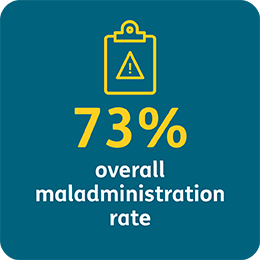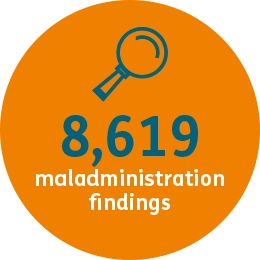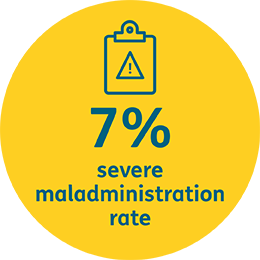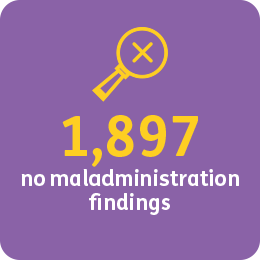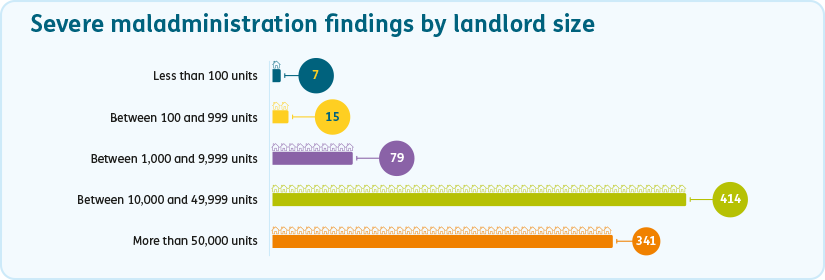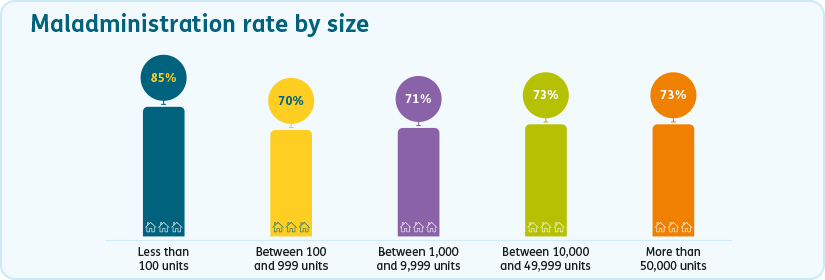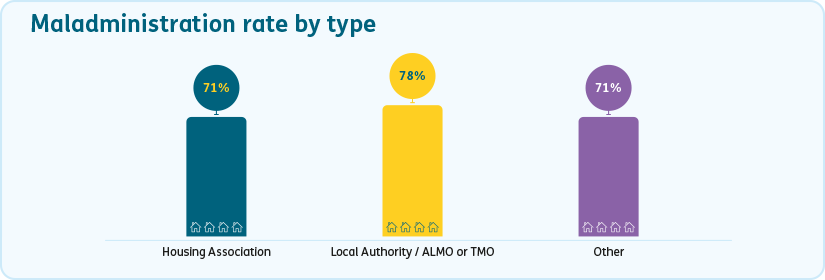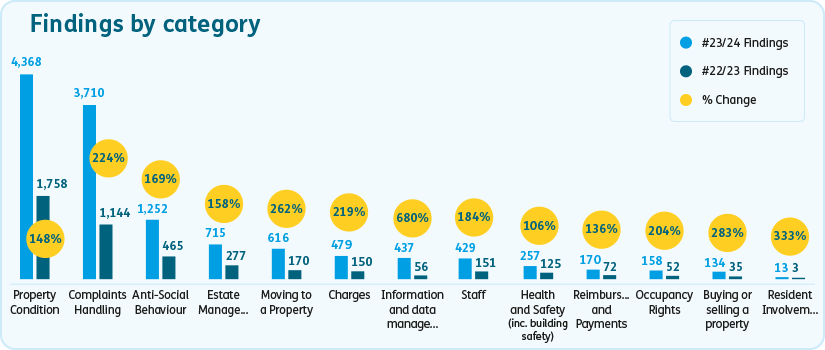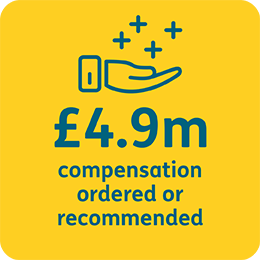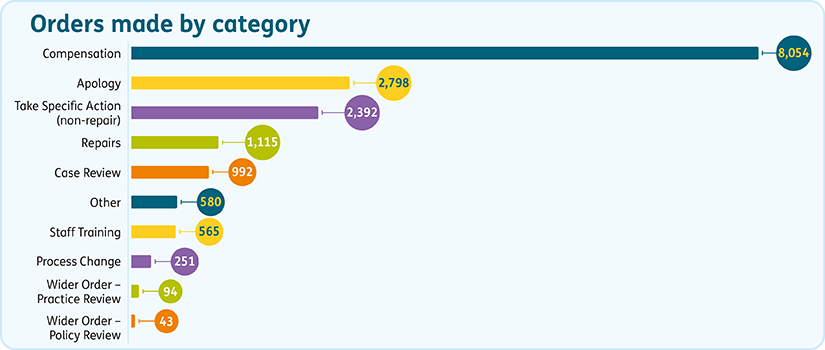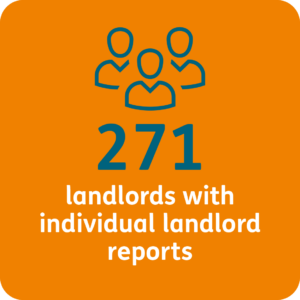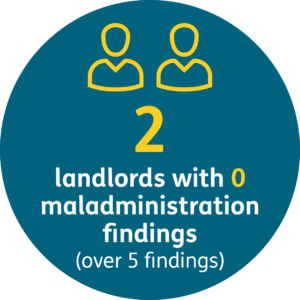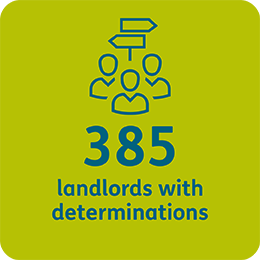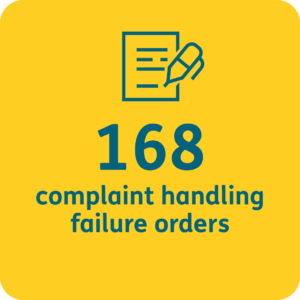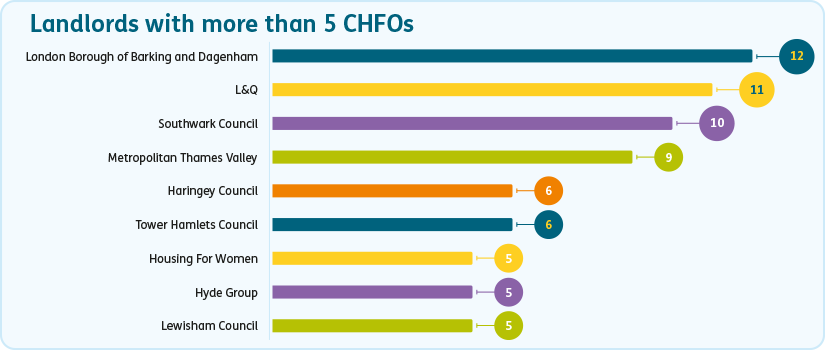Annual Complaints Review 2023-24
Our Annual Complaints Review reveals how well social housing complaints across England are being dealt with, and where the Ombudsman is seeing repeated concerns.
On this page
This page refers to Complaint Handling Failure Orders (CHFOs), which was our process at the time of publication. We now issue Complaint Handling Failure Notices (CHFNs) in these circumstances. View the latest information on how we bring landlords into compliance in casework.
Introduction
Last year, the Ombudsman made 5,465 determinations and within those cases that were not entirely outside our jurisdiction or withdrawn, made 11,835 findings on categories from property condition and antisocial behaviour to record keeping and complaint handling. Following these investigations, we made 21,740 remedies to put things right for residents, ranging from doing repairs to paying compensation and improving practices – a 329% increase.
In addition to the increase in the number of complaints coming to us, we have also witnessed an increase in the failure rate across the board.
Alongside the overall performance data from the social housing sector in 2023-24, the Annual Complaints Review also looks at individual landlord performance, as well as how the sector is performing at a regional level. There is also again a focus on the number of Complaint Handling Failure Orders (CHFOs) issued in the past year, which again shows the need for the statutory Complaint Handling Code we introduced at the start of this year.
Behind every statistic is a resident’s life that has been disrupted by landlord inaction or ineffectiveness. Our cases show this leads to children missing school, reports of declining health or people forced to sleep on sofas or floors.
This could be avoided with more investment into existing homes, improved systems and technology and stronger service management. Without tackling the root causes of complaints, trust in landlords will be eroded, with communities and the economy adversely impacted.
Governing bodies should use this review to test how organisations are handling complaints on these key issues and how its policies are working in practice. Complaints are an early warning sign for landlords and learning from these to provide early resolution can bring huge benefits to both landlord and resident.
Helpful Links
- Landlord performance reports (Opens in a new tab)
- Guidance on landlord reports (pdf) ( pdf, 0.12 MB)
- Landlords with a maladministration rate of 75% or higher (Opens in a new tab)
- Letter to 75% maladministration landlords (pdf) ( pdf, 0.03 MB)
- Letter to 0% maladministration landlords (pdf) ( pdf, 0.03 MB)
Overall sector performance
The Annual Complaints Review reveals an increase in maladministration across the board, with 73% of all decisions resulting in this finding due to the landlord not following its legal requirements, policy or process.
This means in 2023-24 the Ombudsman made 1.6 maladministration findings per determination, up from 0.9 in the previous year.
There is also a 4 percentage point rise in the rate at which we found severe maladministration, now making up 7% of all decisions (up from 131 to 856, 88% of which were for landlords who had more than 10,000 homes). While the number of no maladministration findings increased from 1,192 to 1,897, overall the rate at which the Ombudsman found no maladministration rate fell, from 25% to 15%.
We will continue to publish no maladministration findings on social media and in our Insight reports to showcase how all landlords can resolve complaints positively.
Categories
Every day social landlords do vital work and resolve requests successfully. But where things go wrong the causes are consistent: failing to meet statutory requirements or its own policies and procedures, including failing to recognise hazards, protracted repairs, and overlooking disabilities and health needs.
These failings are compounded by poor communication, complaint handling, and record keeping.
Once again, property condition is the highest complaint category, followed by complaint handling, and then antisocial behaviour. For property condition, 73% of findings were upheld, 84% for the handling of the complaint, 68% for antisocial behaviour and 62% for health and safety, including building safety. Every complaint category has seen an increase.
Remedies
Last year, we made 21,740 interventions to put things right for residents, ranging from doing repairs to paying compensation and improving practices – a 329% increase.
Compensation is up from last year – now sitting at £4.9m. This reflects the increase in determinations and findings that we have made. It also reflects the severity of some of the issues we have seen, with residents only finding out about their rights to bring a complaint to us 10 years after living in damp and mould and therefore receiving a huge compensation payment to reflect this level of failing by the landlord. We are always proportionate in our offers and these offers are not meant to be punitive.
It is clear that we are making a huge range of remedies to put things right for residents and these are all specific to the case they relate to. Whilst compensation and apologies are the 2 most common remedies, the increase in the use of our wider orders powers means we are able to reach beyond a complaint and ensure landlords are fixing things for other residents, preventing complaints from coming to us.
Regional data
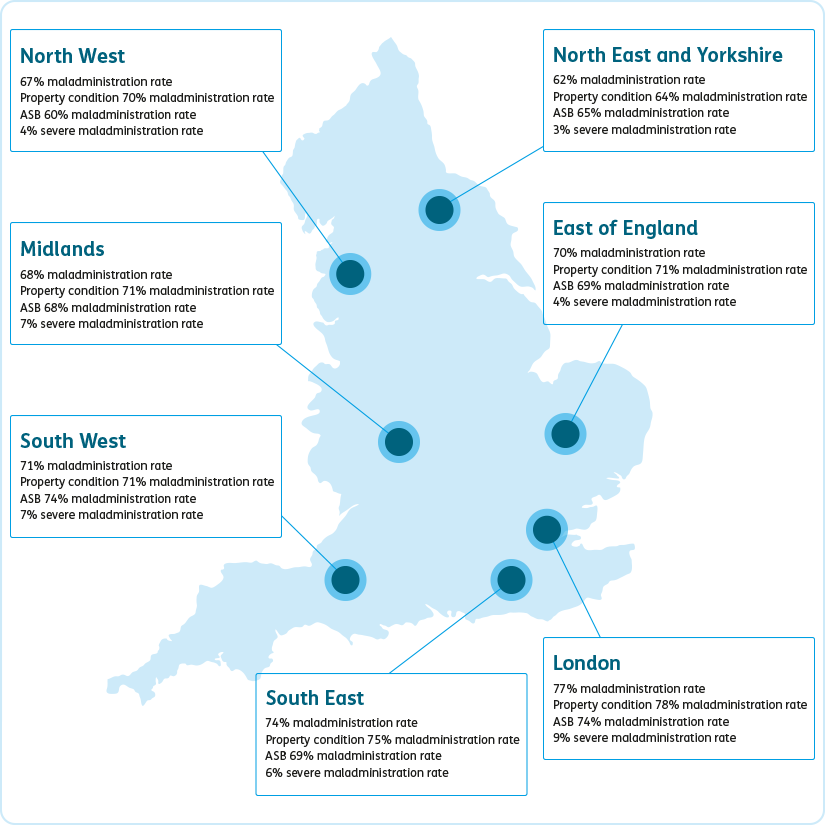
Looking at the regional breakdown of the data and one thing is striking – the maladministration rate for every region has risen by over 10 percentage points.
The area with the highest proportion of decisions upheld was London at 77% compared to the lowest of 62% in the North East and Yorkshire.
And while the severe maladministration rate in London is the highest, the North East, North West, and East of England’s severe maladministration rates are under half that.
The figures in this Review once again show the difficulty of managing homes in the capital – as pointed out in our Insight report released earlier this year – but that does not mean there are ways of mitigating these challenges to provide good services to residents.
Despite the contextual issues in the capital, there are examples of good practice and we will continue to highlight those as we see them.
Individual landlord performance
This year there are 271 landlords with performance reports, up from 163 the year before. Individual landlord performance reports are only issued if the landlord has 5 or more findings made in the financial year.
There were 126 landlords with a maladministration rate of over 75%. Over half of the landlords with performance reports had at least 1 severe maladministration finding.
The Ombudsman has again written to Chief Executives of landlords who have a maladministration rate of over 75% to bring urgent attention to the figures. We have once again compiled a list of those high maladministration landlords, this year divided up by size.
Encouragingly, we have seen some instances where landlords had positive complaint handling cultures. There are 2 landlords with a 0% maladministration rate on 5 findings or more – Pine Ridge Housing Association and The Abbeyfield Society, and we have written to these landlords to welcome the figures shown in their reports.
Additionally, we have seen 5 landlords that have significantly decreased their maladministration rates over the past year and are now sitting below 75% maladministration rate.
Those landlords are:
- Basildon Borough Council from 87% to 64%
- Broadland Housing Association from 78% to 42%
- Cheshire Peaks and Plains Housing Trust from 80% to 38%
- Lewes Council from 80% to 67%
- Southend-on-Sea Council from 83% to 65%
Creating a positive complaint handling culture and ensuring that works in practice can sometimes be a long-term journey, and it is encouraging to see many landlords on their way to improving their maladministration rate.
Complaint Handling Failure Orders
In 2023-24, the Ombudsman issued 168 Complaint Handling Failure Orders (CHFOs), up from 146 the previous year.
There was an even split for those issued to housing associations or local authorities, but the overwhelming majority, 96%, were for those landlords with over 10,000 homes.
There were 9 landlords that received more than 5 failure orders for non-compliance with the Complaint Handling Code in practice. These CHFOs give a real time indicator of how a landlord’s complaints policy is working, and landlords should reflect on these for how it operates moving forwards.
This year we received new powers under the Social Housing Regulation Act to monitor landlords’ compliance with the now-statutory Complaint Handling Code. This means we are able to better intervene where we see non-compliance.
For these 9 landlords, we are currently examining their Complaint Handling Code submissions and will be conducting these assessments. Where these landlords have reported non-compliance with the Code, we will work closely with them to ensure they achieve compliance within a reasonable timescale.
Looking ahead to a positive complaint handling future
The Ombudsman is encouraging landlords to learn from this review. Our Centre for Learning has eLearning modules and workshops to give housing professionals free-to-access materials to improve services. The Centre for Learning also contains case studies, reports, podcasts and more on key topics the sector is facing.
Resolving some of the fundamental issues we have seen in our casework through this Annual Complaints Review can be the catalyst for a better future where landlords prevent complaints coming to us and deliver better outcomes for residents.
Until then, this Review also shows the scale of our intervention. We are making more remedies and, using our wider orders powers, these are becoming more far reaching to put things right for other residents impacted and prevent complaints.
Early next year we will also publish a Spotlight report on disrepair, which is the main driver of complaints, to support landlords to learn from these cases.
The incoming Decent Homes Standard will set minimum conditions of social homes for the next generation. This important and vital programme risks being an unfulfilled promise if landlords do not address the issues exposed by this review. Social landlords also need to ensure they can focus on improving and investing in existing homes when wanting to help build the thousands of more homes needed.
-
Footnote to the Annual Complaints Review
The Housing Ombudsman Service publishes annual statistics on complaints handled and resolved during the previous financial year.
While our complaints statistics are not classified as national statistics and therefore are not bound by the official Code of Practice for Statistics, we voluntarily adhere to its pillars and principles as best practice. Datasets undergo an internal quality assurance process prior to generating individual landlord reports. Reports are generated only for landlords with 5 or more findings in the financial year to prevent misleading conclusions from small datasets. Reports are sent to individual landlords during the summer for verification against their own data. We amend the core dataset as necessary based on their feedback. After verification and amendments, we recalculate the entire dataset and regenerate the individual landlord reports. The corrected dataset is then used to produce our Annual Complaints Review at both national and regional levels.
Landlords with fewer than 5 findings are not named in the national statistics as they have not had the opportunity to verify their data. We do not collect data on locally handled complaints from landlords; thus, our calculations are based solely on cases received and decided by the Service.
For more information on locally handled complaints, refer to the landlord's annual complaints performance and service improvement report, which the Housing Ombudsman Code mandates landlords to produce and publish.
Annual Complaints Review webinar
Annual Complaints Review webinar recording
Centre for Learning webinar
View the Annual Complaints Review webinar recording where experts from across the Housing Ombudsman Service discuss the findings and lessons learned from the review.

